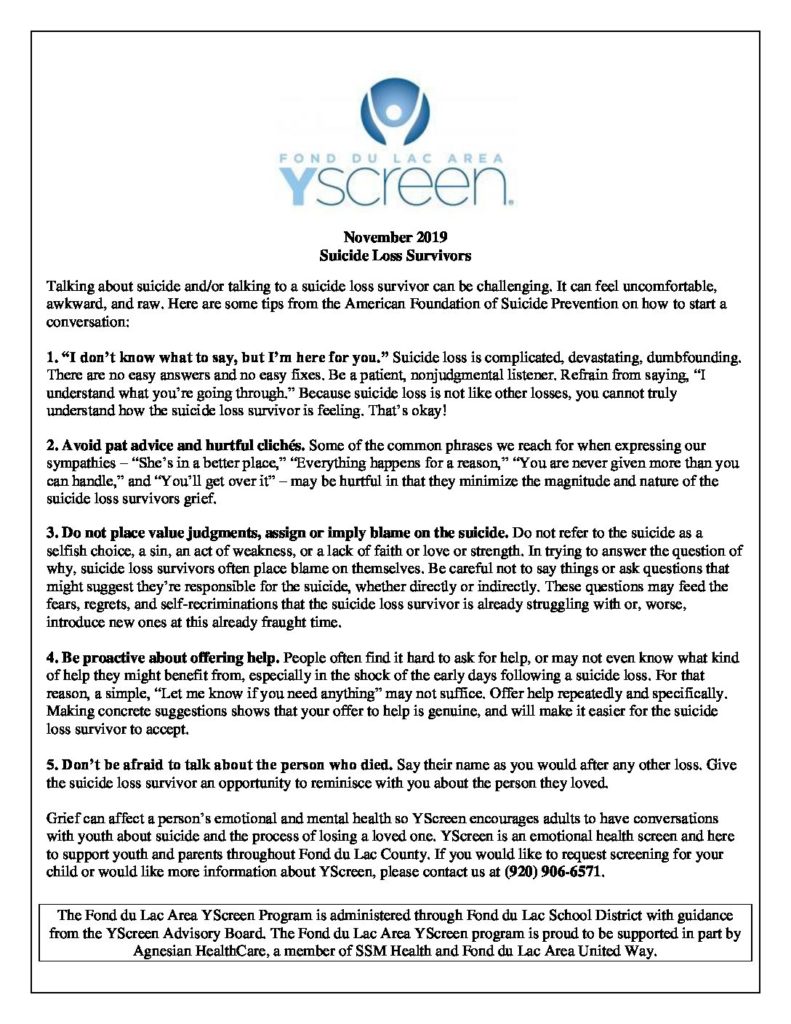November 1, 2019
Suicide Loss Survivors

Talking about suicide and/or talking to a suicide loss survivor can be challenging. It can feel uncomfortable, awkward, and raw. Here are some tips from the American Foundation of Suicide Prevention on how to start a conversation:
1. “I don’t know what to say, but I’m here for you.” Suicide loss is complicated, devastating, dumbfounding. There are no easy answers and no easy fixes. Be a patient, nonjudgmental listener. Refrain from saying, “I understand what you’re going through.”Because suicide loss is not like other losses, you cannot truly understand how the suicide loss survivor is feeling. That’s okay!
2. Avoid pat advice and hurtful clichés. Some of the common phrases we reach for when expressing our sympathies – “She’s in a better place,” “Everything happens for a reason,” “You are never given more than you can handle,” and “You’ll get over it” – may be hurtful in that they minimize the magnitude and nature of the suicide loss survivors grief.
3. Do not place value judgments, assign or imply blame on the suicide. Do not refer to the suicide as a selfish choice, a sin, an act of weakness, or a lack of faith or love or strength.In trying to answer the question of why, suicide loss survivors often place blame on themselves. Be careful not to say things or ask questions that might suggest they’re responsible for the suicide, whether directly or indirectly. These questions may feed the fears, regrets, and self-recriminations that the suicide loss survivor is already struggling with or, worse, introduce new ones at this already fraught time.
4. Be proactive about offering help. People often find it hard to ask for help, or may not even know what kind of help they might benefit from, especially in the shock of the early days following a suicide loss. For that reason, a simple, “Let me know if you need anything” may not suffice. Offer help repeatedly and specifically. Making concrete suggestions shows that your offer to help is genuine, and will make it easier for the suicide loss survivor to accept.
5. Don’t be afraid to talk about the person who died. Say their name as you would after any other loss. Give the suicide loss survivor an opportunity to reminisce with you about the person they loved.6
6. Do not ask intrusive questions about how the person died. If the suicide loss survivor does not bring up the suicide method, assume they would prefer not to talk about it. If they do mention how their loved one died, do not ask for details beyond those that the suicide loss survivor volunteers.
7. Be patient. Don’t place a timeline on the loss survivor’s grief; healing after a suicide loss is a lifelong journey.
Grief can affect a person’s emotional and mental health so YScreen encourages adults to have conversations with youth about suicide and the process of losing a loved one. YScreen is an emotional health screen and here to support youth and parents throughout Fond du Lac County. If you would like to request screening for your child or would like more information about YScreen, please contact us at (920) 906-6571.
For Downloadable Version of the Newsletter Click Below

